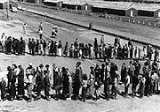
Korematsu v. United States
Overview
Case citation
Case citation is the system used in many countries to identify the decisions in past court cases, either in special series of books called reporters or law reports, or in a 'neutral' form which will identify a decision wherever it was reported...
(1944), was a landmark United States Supreme Court
Supreme Court of the United States
The Supreme Court of the United States is the highest court in the United States. It has ultimate appellate jurisdiction over all state and federal courts, and original jurisdiction over a small range of cases...
case concerning the constitutionality of Executive Order 9066
Executive Order 9066
United States Executive Order 9066 was a United States presidential executive order signed and issued during World War II by U.S. President Franklin D. Roosevelt on February 19, 1942 authorizing the Secretary of War to prescribe certain areas as military zones...
, which ordered Japanese American
Japanese American
are American people of Japanese heritage. Japanese Americans have historically been among the three largest Asian American communities, but in recent decades have become the sixth largest group at roughly 1,204,205, including those of mixed-race or mixed-ethnicity...
s into internment camps
Japanese American internment
Japanese-American internment was the relocation and internment by the United States government in 1942 of approximately 110,000 Japanese Americans and Japanese who lived along the Pacific coast of the United States to camps called "War Relocation Camps," in the wake of Imperial Japan's attack on...
during World War II
World War II
World War II, or the Second World War , was a global conflict lasting from 1939 to 1945, involving most of the world's nations—including all of the great powers—eventually forming two opposing military alliances: the Allies and the Axis...
.
In a 6-3 decision, the Court sided with the government, ruling that the exclusion order was constitutional
Constitutionality
Constitutionality is the condition of acting in accordance with an applicable constitution. Acts that are not in accordance with the rules laid down in the constitution are deemed to be ultra vires.-See also:*ultra vires*Company law*Constitutional law...
. The opinion, written by Supreme Court justice Hugo Black
Hugo Black
Hugo Lafayette Black was an American politician and jurist. A member of the Democratic Party, Black represented Alabama in the United States Senate from 1927 to 1937, and served as an Associate Justice of the Supreme Court of the United States from 1937 to 1971. Black was nominated to the Supreme...
, held that the need to protect against espionage outweighed Fred Korematsu
Fred Korematsu
was one of the many Japanese-American citizens living on the West Coast during World War II. Shortly after the Imperial Japanese Navy attacked Pearl Harbor, President Franklin D. Roosevelt issued Executive Order 9066, authorizing the Secretary of War and his military commanders to require all...
's individual rights, and the rights of Americans of Japanese descent.
Unanswered Questions

